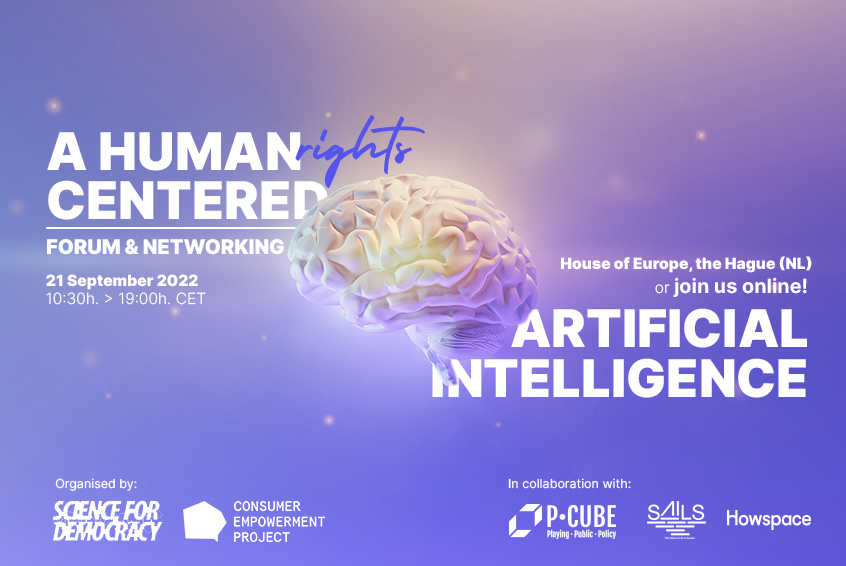
Simone Picenni, a member of Science for Democracy, and his colleague Francesca Bellazzi received the SIFA Young Scholar Prize for their work on “Alethic Rights, Epistemic (In)justice, and the Right to Science”. Below you can read and download the extended abstract of their work.
Alethic rights and epistemic (in)justice
October 3, 2022
Article 27 of the Universal Declaration of Human Rights [Ass48] mentions the “right […] to share in scientific advancement and its benefits.”, and Article 15 of the International Covenant on Economic, Social and Cultural Rights [Ass96] establishes the right to “take part in cultural life;to enjoy the benefits of scientific progress and its applications; to benefit from the protection of the moral and material interests resulting from any scientific, literary or artistic production of which he is the author”. The so-called right to science has aroused growing interest in philosophers and jurists in recent years [see BR18, PM21, Mas21b, Mas21a, for an overview], but the relationship between the right to science and alethic rights [d7] – that is, rights to truth – and epistemic injustice [Fri07] – and in particular whether and to what extent the right to science is a right not to suffer epistemic injustice (as Franca D’Agostini seems to suggest in [d7]) – has not yet been thoroughly investigated. In the present work, we aim to tackle these questions.
Rights to Truth, and the Right to Science
Truth should be considered a source of (political, societal) goods: it plays a fundamental role in the establishment of conventions and in the cooperation between social agents [Lew08, d7], it is a substantial component of information [Flo13] and scientific progress [Nii14, Psi05, LC22, Mas16], it is the aim of criminal justice [Mar07], and its systematic distortion can damage people and community [d7]. As a source of political, societal goods, Franca D’Agostini convincingly argues in [d7], truth should be politcally defended, and everyone has alethic rights – i.e.: rights to truth.
But what does it mean to have rights to truth? Here our perspective slightly differs from the one of [d7].
According to our favorite view on the subject matter, truth is a fundamental semantic property of sentences (in context) [Gla15, Fie72]: the truth of a sentence is determined compositionally (i.e.: from certain semantic properties of the parts, including its subsentences) by facts about satisfaction, reference, fullfilment [Fie72] (which are semantic notions). As a semantic concept, the condition of possibility of a felicitous, useful, and refined use of it are granted by the possession of a good semantic capital. The notion of semantic capital is due to Luciano Floridi [Flo18]: according to Floridi’s definition, the semantic capital of an agent is any content that can enhance the agent’s power to give meaning and to make sense of (semanticise) something. If truth is a semantic concept, and possession of good semantic capital is a prerequisite of the felicitous semantic enterprise of an agent, then the protection of truth requires, and could be a product of, the protection of semantic capital of agents.
In fact, semantic capital is at risk, and nees to be properly conserved, diversified, and updated, in order not to be underused or used in unproductive ways, not to be misused, depriciated, or lost (these are the risks that Floridi [Flo18] individuates). Such a protection of semantic capital really is, indeed, protecti[on] […] [of ] truth against falsehood [Flo18].
We think that we can really concieve as the protection of semantic capital of an agent as a right of the agent as the foundamental alethic right of the agent. We also think that such a right should be systematically linked to the human right to science: in fact, given the foundational role truth plays in the scientific endeavour and scientific progress, it can play a foundational role with respect to it from a conceptual point of view; but it can and should be positively reinforced by the right to science, since science plays an important role in allowing for refinement, precisification and update of semantic capital.
Epistemic (in)justice and the Right to Science
The Human Right to Science is recognised by the UN among the human rights. But what is the role of such rights and why should they be protected We could ask the same question concerning the rights to truth. A possible foundation and justification for the Human Rights to Science is the prevention of forms of epistemic injustice. As we shall see, having a refined semantic capital and its usage can prevent specific forms of such injustices.
The study of epistemic injustice is a field of philosophy that links together epistemology, ethics and political philosophy, and considers how systems and institutions of knowledge can be damaging or beneficial for those engaging in knowledge related activities, such as truth and science. More in detail, epistemic injustice refers to forms of wrongs that are perpetuated against agents qua “knowers”, where with knowers we mean anyone engaged in activities related to knowledge. These include, among others, wrongs to particular knowers as knowers, e.g. disregarding a knower’s testimony, not providing access to what is in the interest of the knower to know; wrongs that cause epistemic dysfunction, e.g. the distortion of understanding or the prevention of given inquiries; and wrongs that come inside or via epistemic institutions and practices such as the scientific ones. In the case concerning the Right to Science, we could ask whether these rights can prevent forms of epistemic injustice. In particular, we focus on two aspects of the right to science: the first is the right to benefit from scientific method and knowledge, and the second is the right to have access to science and scientific method and knowledge. We argue that these rights can prevent at least some forms of two kinds of epistemic injustice: testimonial injustice and hermeneutical injustice.
Testimonial injustice is a form of injustice for which a knower’s testimony is not given the appropriate level of credibility, owned to non-relevant parameters such as forms of prejudices based on race, class or gender. While this form of injustice can be easily seen in trial setting, it also happens in other institutional contexts when a given source of knowledge or a given knower is not deemed a reliable source in virtue of non relevant parameter. In parallel, a form of testimonial justice is preserved when a knower’s testimony is evaluated and considered for its epistemic value. Hermeneutical injustice represents a less intuitive notion. Forms of hermeneutical injustice occurs when a given knower lacks the conceptual, epistemic and hermeneutical resources to understand their experiences or given field of knowledge or discipline. These forms of injustice can happen because the conceptual tools are absent or not provided or because the knower is prevented from having access to them. This form of injustice might lead to forms of hermeneutical marginalisation, when there is a group that is blocked whether intentionally or unintentionally from access to knowledge, or access to communicating knowledge due to a gap in hermeneutical resources. On the opposite, hermeneutical justice can be maintained when the knower is given the hermeneutical resources and tools to interpret different domains of knowledge and experience.
The two aspects of the right to science aforementioned can prevent these forms of injustices. The right to benefit from scientific method and knowledge can prevent forms of testimonial injustice, as all knowers would be recognised with the relevant level of credibility to speak, interact and act on the base of having access to scientific method. This right also prevents forms of hermeneutical injustice because the different knowers would be able to gain and use the relevant hermeneutical tools to interpret scientific concepts and to make personal and public decisions related to scientific matters, while contrasting forms of hermeneutical marginalisation. Also, the right to have access to scientific method and knowledge has a role in contrasting the two aforementioned forms of epistemic injustice. This right prevents forms of testimonial injustice because all knowers would have access to scientific knowledge and so they are in the position to be considered and consider themselves valid testimonies in terms of scientific matters, if needed. This right also prevents forms of hermeneutical injustice as it considers the accessibility to the conceptual, hermeneutical and epistemic tools to interpret and understand scientific knowledge. In this case, forms of hermeneutical marginalisation can be prevented.
Concluding, we believe that the discussion and connection of the debates concerning epistemic injustice with the right to science can have a series of benefits. The first is a pragmatic benefit, as the prevention of forms of epistemic injustices seems a good pragmatic reason to implement such rights. The second is a foundational benefit, as it offers a reason and justification for why these rights should be protected and are present in the among the human rights. The latter is a communication benefit, as the categories present in the debate concerning epistemic injustice can offer tools to communicators devoted to presenting the importance of the right to science. Moreover, these discussions can lead and inform many other aspects related to the links between science and our societies.
References
Ass48] UN General Assembly. Universal declaration of human rights. UN
General Assembly, 302(2):14–25, 1948.
[Ass96] UN General Assembly. International covenant on economic, social
and cultural rights. UN General Assembly, 1996.
[BR18] Andrea Boggio and Cesare PR Romano. Freedom of research and the right to science: from theory to advocacy. The freedom of scientific
research: Bridging the gap between science and society, pages 162-
175, 2018.
[d7] Franca d’Agostini. Diritti aletici. Biblioteca della libert`a, 52(218):5–
42, 2017.
[Fie72] Hartry Field. Tarski’s theory of truth. The Journal of Philosophy,
69(13):347–375, 1972.
[Flo13] Luciano Floridi. The philosophy of information. OUP Oxford, 2013.
[Flo18] Luciano Floridi. Semantic capital: its nature, value, and curation.
Philosophy & Technology, 31(4):481–497, 2018.
[Fri07] Miranda Fricker. Epistemic injustice: Power and the ethics of knowing. Oxford University Press, 2007.
[Gla15] Michael Glanzberg. Complexity and hierarchy in truth predicates. In
Unifying the philosophy of truth, pages 211–243. Springer, 2015.
[LC22] Hannes Leitgeb and Andr´e Carus. Rudolf Carnap. In Edward N. Zalta
and Uri Nodelman, editors, The Stanford Encyclopedia of Philosophy.
Metaphysics Research Lab, Stanford University, Fall 2022 edition,
2022.
[Lew08] David Lewis. Convention: A philosophical study. John Wiley & Sons,
2008.
[Mar07] Diego Marconi. Per la verit`a. Relativismo e filosofia. Einaudi, 2007.
[Mas16] Michela Massimi. Three tales of scientific success. Philosophy of
Science, 83(5):757–767, 2016.
[Mas21a] Michela Massimi. Epistemic severing and epistemic trademarking.
two garden varieties of epistemic injustice in science. 2021.
[Mas21b] Michela Massimi. Perspectival realism. Oxford University Press, 2021.
[Nii14] Ilkka Niiniluoto. Scientific progress as increasing verisimilitude. Studies in History and Philosophy of Science Part A, 46:73–77, 2014.
[PM21] Helle Porsdam and Sebastian Porsdam Mann, editors. The Right to
Science: then and Now. Cambridge University Press, Cambridge,
England, December 2021.
[Psi05] Stathis Psillos. Scientific realism: How science tracks truth. Routledge, 2005.
Authors: Simone Picenni & Francesca Bellazzi, PhD students at Bristol Univeristy






